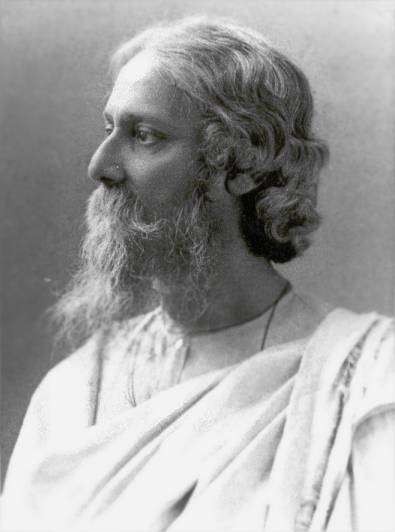Summary | Excerpt | Reading Guide | Reviews | Beyond the Book | Read-Alikes | Genres & Themes | Author Bio

This article relates to Odysseus Abroad
Set in 1980s London, Odysseus Abroad features a young Bengali protagonist Ananda Sen, who is in the city to study poetry — "his sights were set on the Olympian, the Parnassian: especially getting published in Poetry Review." The elephant in the room is the greatest of all Bengali poets, Rabindranath Tagore (1861-1941). Even if the venerable polymath once lived in London, he is no longer remembered, bemoan uncle and nephew in the novel: "...to be a Bengali in London meant being the owner of a Bangladeshi restaurant. What a joke, what a come-down!"
 Rabindranath Tagore (pronounced in Bengali as Row-bean-dra-naath Tag-ore) was a scion of a venerable Calcutta family; father Debendranath was a key figure in the Brahmo Samaj, a progressive body that denounced Hindu practices such as child marriage and Sati (widow burning), and whose members embraced a new form of the religion with a focus away from temple and deity worship.
Rabindranath Tagore (pronounced in Bengali as Row-bean-dra-naath Tag-ore) was a scion of a venerable Calcutta family; father Debendranath was a key figure in the Brahmo Samaj, a progressive body that denounced Hindu practices such as child marriage and Sati (widow burning), and whose members embraced a new form of the religion with a focus away from temple and deity worship.
Tagore won the Nobel Prize in Literature in 1913, the first Asian to do so. The Nobel committee recognized his "profoundly sensitive, fresh and beautiful verse, by which, with consummate skill, he has made his poetic thought, expressed in his own English words, a part of the literature of the West." Accepting the award, Tagore thanked "the breadth of understanding which has brought the distant near, and has made a stranger a brother."
 Tagore started writing poetry when he was merely eight years old; his first formal collection, which he published at just sixteen under the pseudonym "Sun Lion," was thought to be a long-lost classic. Even if he was best known for his poetry, Tagore was a polymath, writing short stories, songs (he composed India's and Bangladesh's national anthems), and plays. He even created paintings, a side he explored only later in life in his sixties. On the occasion of the 150th anniversary of his birth, the Victoria and Albert Museum in London hosted a retrospective of Tagore's visual artwork.
Tagore started writing poetry when he was merely eight years old; his first formal collection, which he published at just sixteen under the pseudonym "Sun Lion," was thought to be a long-lost classic. Even if he was best known for his poetry, Tagore was a polymath, writing short stories, songs (he composed India's and Bangladesh's national anthems), and plays. He even created paintings, a side he explored only later in life in his sixties. On the occasion of the 150th anniversary of his birth, the Victoria and Albert Museum in London hosted a retrospective of Tagore's visual artwork.
Tagore's impressive breadth of knowledge came, not from formal schooling, but from studies ventured on his own, as well as from various tutors. Sent to London because his father wanted his youngest son to become a barrister, Tagore didn't last long there, and soon came back home.
The Tagores were rich landowners, and managing the family's various estates brought Rabindranath in close touch with India's everyman, which ignited a spark for social reforms. Always harboring a passion for learning, he established a school, and later a university, for the underprivileged in rural West Bengal, Shantiniketan (translates to abode of peace) and fought ardently for a more progressive model of society.
 Rabindranath Tagore was also marginally involved in India's freedom movement (veteran freedom fighters Mahatma Gandhi and Pandit Jawaharlal Nehru, independent India's first prime minister, counted Tagore as their friend). Knighted by the British government in 1915, he renounced the honor after the infamous Jallianwalla Bagh Massacre in 1919.
Rabindranath Tagore was also marginally involved in India's freedom movement (veteran freedom fighters Mahatma Gandhi and Pandit Jawaharlal Nehru, independent India's first prime minister, counted Tagore as their friend). Knighted by the British government in 1915, he renounced the honor after the infamous Jallianwalla Bagh Massacre in 1919.
Arguably no other person living or dead has had as much of an influence on the Bengali ethos as much as Tagore. Bengalis revere him for not only changing the course of their art but also, with his progressive views, the society at large. His Rabindra Sangeet (literally Rabindra's songs) are still sung. You can find clips online and read some of his poems too.
Rabindranath Tagore, courtesy of Saravask
A pastel-coloured rendition of a Malaganmask from northern New Ireland by Tagore, courtesy of Jayantanth
Another piece of art by Tagore, notice his Bengali-language initials are worked into this "Ro-Tho" wooden seal, stylistically similar to designs used in traditional Haida carvings, courtesy of Riana
Filed under People, Eras & Events
![]() This "beyond the book article" relates to Odysseus Abroad. It originally ran in April 2015 and has been updated for the
February 2016 paperback edition.
Go to magazine.
This "beyond the book article" relates to Odysseus Abroad. It originally ran in April 2015 and has been updated for the
February 2016 paperback edition.
Go to magazine.
The whole problem with the world is that fools and fanatics are always so certain of themselves, and wiser people ...
Click Here to find out who said this, as well as discovering other famous literary quotes!
Your guide toexceptional books
BookBrowse seeks out and recommends the best in contemporary fiction and nonfiction—books that not only engage and entertain but also deepen our understanding of ourselves and the world around us.